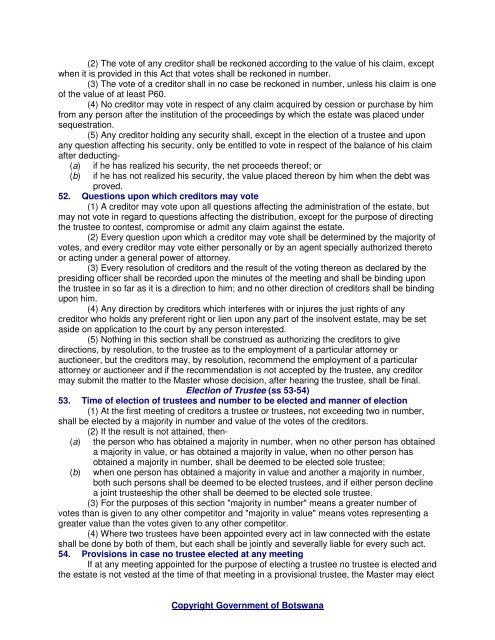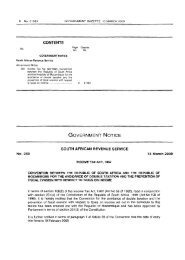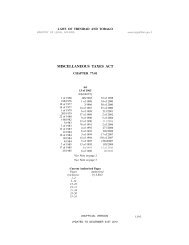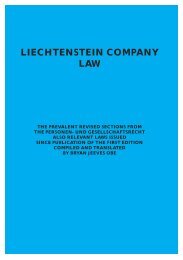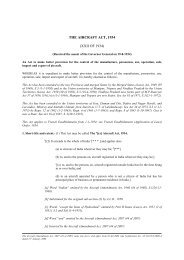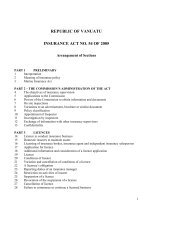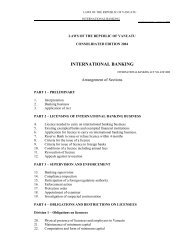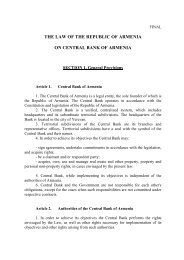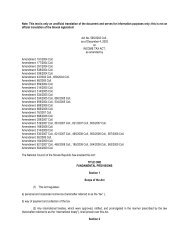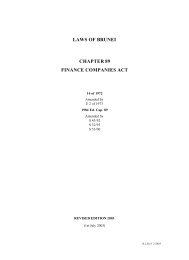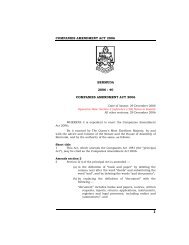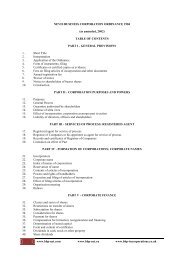Insolvency Act.pdf - Intax Info
Insolvency Act.pdf - Intax Info
Insolvency Act.pdf - Intax Info
You also want an ePaper? Increase the reach of your titles
YUMPU automatically turns print PDFs into web optimized ePapers that Google loves.
(2) The vote of any creditor shall be reckoned according to the value of his claim, except<br />
when it is provided in this <strong>Act</strong> that votes shall be reckoned in number.<br />
(3) The vote of a creditor shall in no case be reckoned in number, unless his claim is one<br />
of the value of at least P60.<br />
(4) No creditor may vote in respect of any claim acquired by cession or purchase by him<br />
from any person after the institution of the proceedings by which the estate was placed under<br />
sequestration.<br />
(5) Any creditor holding any security shall, except in the election of a trustee and upon<br />
any question affecting his security, only be entitled to vote in respect of the balance of his claim<br />
after deducting-<br />
(a)<br />
(b)<br />
if he has realized his security, the net proceeds thereof; or<br />
if he has not realized his security, the value placed thereon by him when the debt was<br />
proved.<br />
52. Questions upon which creditors may vote<br />
(1) A creditor may vote upon all questions affecting the administration of the estate, but<br />
may not vote in regard to questions affecting the distribution, except for the purpose of directing<br />
the trustee to contest, compromise or admit any claim against the estate.<br />
(2) Every question upon which a creditor may vote shall be determined by the majority of<br />
votes, and every creditor may vote either personally or by an agent specially authorized thereto<br />
or acting under a general power of attorney.<br />
(3) Every resolution of creditors and the result of the voting thereon as declared by the<br />
presiding officer shall be recorded upon the minutes of the meeting and shall be binding upon<br />
the trustee in so far as it is a direction to him; and no other direction of creditors shall be binding<br />
upon him.<br />
(4) Any direction by creditors which interferes with or injures the just rights of any<br />
creditor who holds any preferent right or lien upon any part of the insolvent estate, may be set<br />
aside on application to the court by any person interested.<br />
(5) Nothing in this section shall be construed as authorizing the creditors to give<br />
directions, by resolution, to the trustee as to the employment of a particular attorney or<br />
auctioneer, but the creditors may, by resolution, recommend the employment of a particular<br />
attorney or auctioneer and if the recommendation is not accepted by the trustee, any creditor<br />
may submit the matter to the Master whose decision, after hearing the trustee, shall be final.<br />
Election of Trustee (ss 53-54)<br />
53. Time of election of trustees and number to be elected and manner of election<br />
(1) At the first meeting of creditors a trustee or trustees, not exceeding two in number,<br />
shall be elected by a majority in number and value of the votes of the creditors.<br />
(2) If the result is not attained, then-<br />
(a)<br />
(b)<br />
the person who has obtained a majority in number, when no other person has obtained<br />
a majority in value, or has obtained a majority in value, when no other person has<br />
obtained a majority in number, shall be deemed to be elected sole trustee;<br />
when one person has obtained a majority in value and another a majority in number,<br />
both such persons shall be deemed to be elected trustees, and if either person decline<br />
a joint trusteeship the other shall be deemed to be elected sole trustee.<br />
(3) For the purposes of this section "majority in number" means a greater number of<br />
votes than is given to any other competitor and "majority in value" means votes representing a<br />
greater value than the votes given to any other competitor.<br />
(4) Where two trustees have been appointed every act in law connected with the estate<br />
shall be done by both of them, but each shall be jointly and severally liable for every such act.<br />
54. Provisions in case no trustee elected at any meeting<br />
If at any meeting appointed for the purpose of electing a trustee no trustee is elected and<br />
the estate is not vested at the time of that meeting in a provisional trustee, the Master may elect<br />
Copyright Government of Botswana


